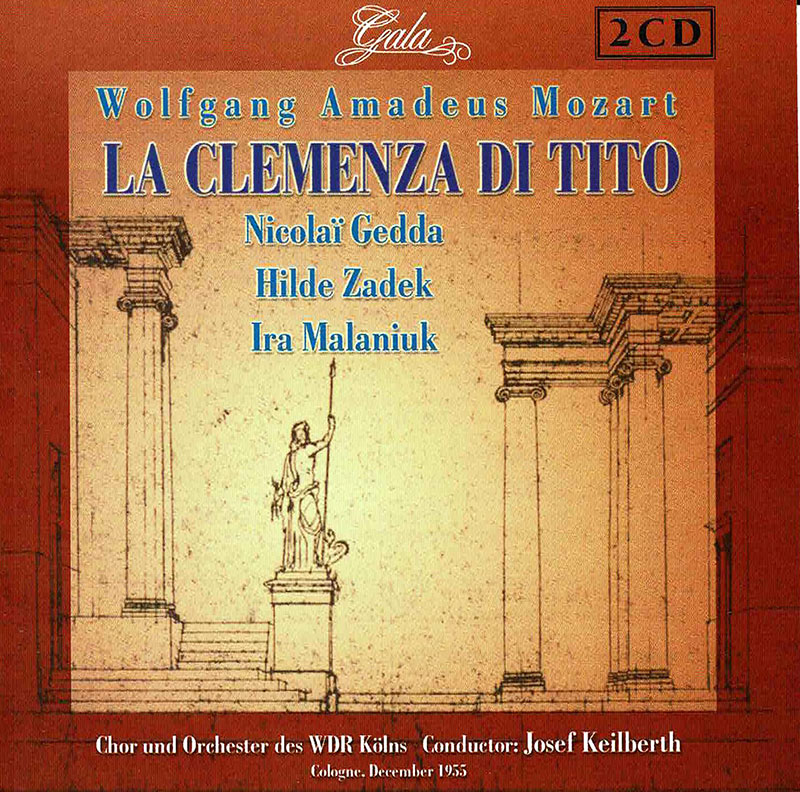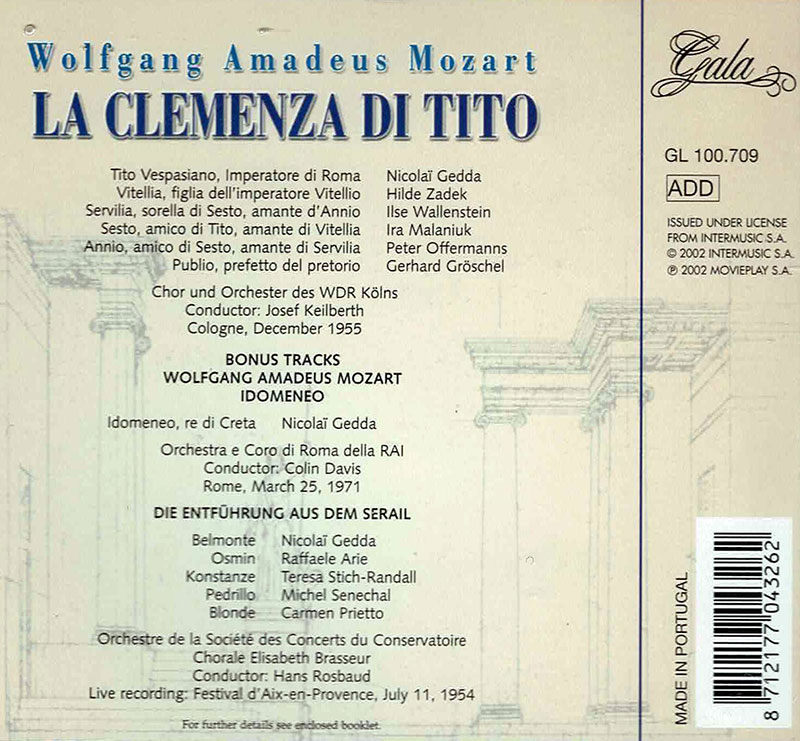Logowanie
OSTATNI taki wybór na świecie
Nancy Wilson, Peggy Lee, Bobby Darin, Julie London, Dinah Washington, Ella Fitzgerald, Lou Rawls
Diamond Voices of the Fifties - vol. 2
Tylko 1000 egzemplarzy!!!
DVORAK, BEETHOVEN, Boris Koutzen, Royal Classic Symphonica
Symfonie nr. 9 / Wellingtons Sieg Op.91
nowa seria: Nature and Music - nagranie w pełni analogowe
Petra Rosa, Eddie C.
Celebrating the art and spirit of music - vol. 3 - Pure
warm sophisticated voice...
Peggy Lee, Doris Day, Julie London, Dinah Shore, Dakota Station
Diamond Voices of the fifthies
Tylko 1000 egzemplarzy!!!
SAMPLER - STS DIGITAL, Buddy Tate, Milt Buckner, Walace Bishop
Jazz Masters - Legendary Jazz Recordings - v. 1
proszę pokazać mi drugą taką płytę na świecie!
Chesky! Niezmiennie perfekcyjny
Winylowy niezbędnik
ClearAudio
Double Matrix Professional - Sonic
najbardziej inteligentna i skuteczna pralka do płyt winylowych wszelkiego typu - całkowicie automatyczna
MOZART, Nicoali Gedda, Hilde Zadek, Ira Malaniuk, Kolner Rundfunk-Sinfonie-Orchester, Joseph Keilberth
La Clemenza Di Tito

Performer: Gerhard Gröschel (Bass), Ilse Wallenstein (Soprano), Ira Malaniuk (Contralto (Female alto)), Nicolai Gedda (Tenor), Hilde Zadek (Soprano), Peter Offermanns (Bass) Conductor: Joseph Keilberth Orchestra/Ensemble: Cologne Radio Symphony Orchestra, Cologne Radio Chorus Date of Recording: 1955 Recordings and even performances of La clemenza di Tito were few and far between fifty years ago and so it is interesting to have this recording, made under studio conditions in what is today WDR in Cologne. The biggest name is of course Nicolai Gedda, here caught quite early in his career but already a much-recorded singer after only three years on the international circuit. He was a fine Mozartean and recorded several of the operas on commercial discs - but as far as I know not this one , even though one aria was included in a Mozart recital from a few years later. It is also mainly for his participation that this set is of interest to a wider public. This doesn’t imply that there couldn’t be other reasons to acquire it. One such is the conductor. Reading reviews from his lifetime, and even later, Joseph Keilberth was rarely regarded as a "great" conductor, rather a reliable but middling Kapellmeister. In later years opinions have changed, however, not least through his Wagner recordings from Bayreuth. His Decca albums of Lohengrin and Der fliegende Holländer count among the best. Recently, Testament have issued the first ever stereo Ring cycle which has received glowing reviews and even been hailed as the most recommendable version ever issued. His Mozartean credentials are a lesser known quantity, but there is a companion Zauberflöte on Capriccio from the same source with actually more prominent soloists: Josef Greindl, Rudolf Schock, Wilma Lipp, Teresa Stich-Randall, Erich Kunz and others – mouth-watering, isn’t it? If his conducting has the same characteristics there as on this Clemenza di Tito, it must be a lively affair. There is forward movement from the beginning, and comparing tempos to Charles Mackerras on his recent DG set, Keilberth is often a notch faster and notably so in Sesto’s second act rondo Deh, per questo istante solo, where he beats Mackerras by almost two minutes – and still it doesn’t sound rushed. Elsewhere the situation can be reversed but on the whole his tempo choices make sense. He lacks the elasticity and lightness that Mackerras’s chamber orchestra produces and which is in line with the "modern" or "authentic" approach. Where he can’t compete is in sound quality. The 1955 sound is clean and detailed and has wide dynamics but the actual sound is a bit glassy and lacks warmth. This also affects the singing. How much is difficult to judge but even Gedda – the voice I really know from uncountable recordings – sounds slightly strained in places and even atypically pinched in the second act aria Se all’impero, amici Dei. His singing is mostly up to what one expects, his diction impeccable and his final accompanied recitative, Ma che giorno è mai questo? where he forgives everyone, is thrillingly dramatic. The leading ladies – or female voices rather – are not on this level. Hilde Zadek, not too frequently recorded, has, on this hearing, a metallic edge, that makes her sound nastier than she is. She is not always ideally steady but dramatically she has her moments, best of all, fortunately, in the recitative that precedes her big second act rondo, the one with the basset horn. In the rondo her slightly acidulous tones are sharply contrasted to the warm and mellow instrument. She also sports a surprisingly full and dark chest-register, always a touchstone in this cruelly wide-ranging aria. The trouser role Sesto is allotted to the even less recorded Ira Malaniuk. She is rather uneven, but is at her best in her set piece Parto, parto in act one. Of the other singers the to me unknown Ilse Wallenstein as Servilia has a crystal-clear light soprano, that makes one listen every time she appears, which isn’t too often. Annio should be another trouser role but here he is sung by a light tenor, Peter Offermanns, who sounds rather anaemic in his first aria but appears much more secure and with more sap in the voice in the second one. Gerhard Gröschel, who sings Publio, has a big, sonorous voice but not particularly subtle. As for the production readers should be warned that all the recitatives are gone. In a way that’s no big loss, since they are not by Mozart anyway – presumably it was his pupil Süssmayr, he who completed the Requiem, who wrote them. They are not very distinguished and there are a lot of them. In their place, WDR employed a narrator who – in German - relates the story, gives some background and sums up the recitatives; a good idea for broadcasting purposes. Rolf Henniger articulates excellently and the only drawback is that he is so reticent. He is well modulated but sounds sad most of the time and makes no attempt to invest some drama in the narration. Those who are not fluent in German can breathe freely when they learn that all the spoken text is printed in the booklet – in German and in English translation. The music is performed complete and the booklet has extensive historical notes. While this set can never be a first recommendation it has some good things to offer. Admirers of Gedda, among whom I count myself, may be interested in the set. Others should go to one of the more modern versions, of which I am very fond of Mackerras with Magdalena Kozena and Hillevi Martinpelto, both on good form. A last question to Capriccio: how can the box, and the discs, be marked DDD? Doesn’t the first D imply that the recording was made digitally? In 1955? Göran Forsling





























